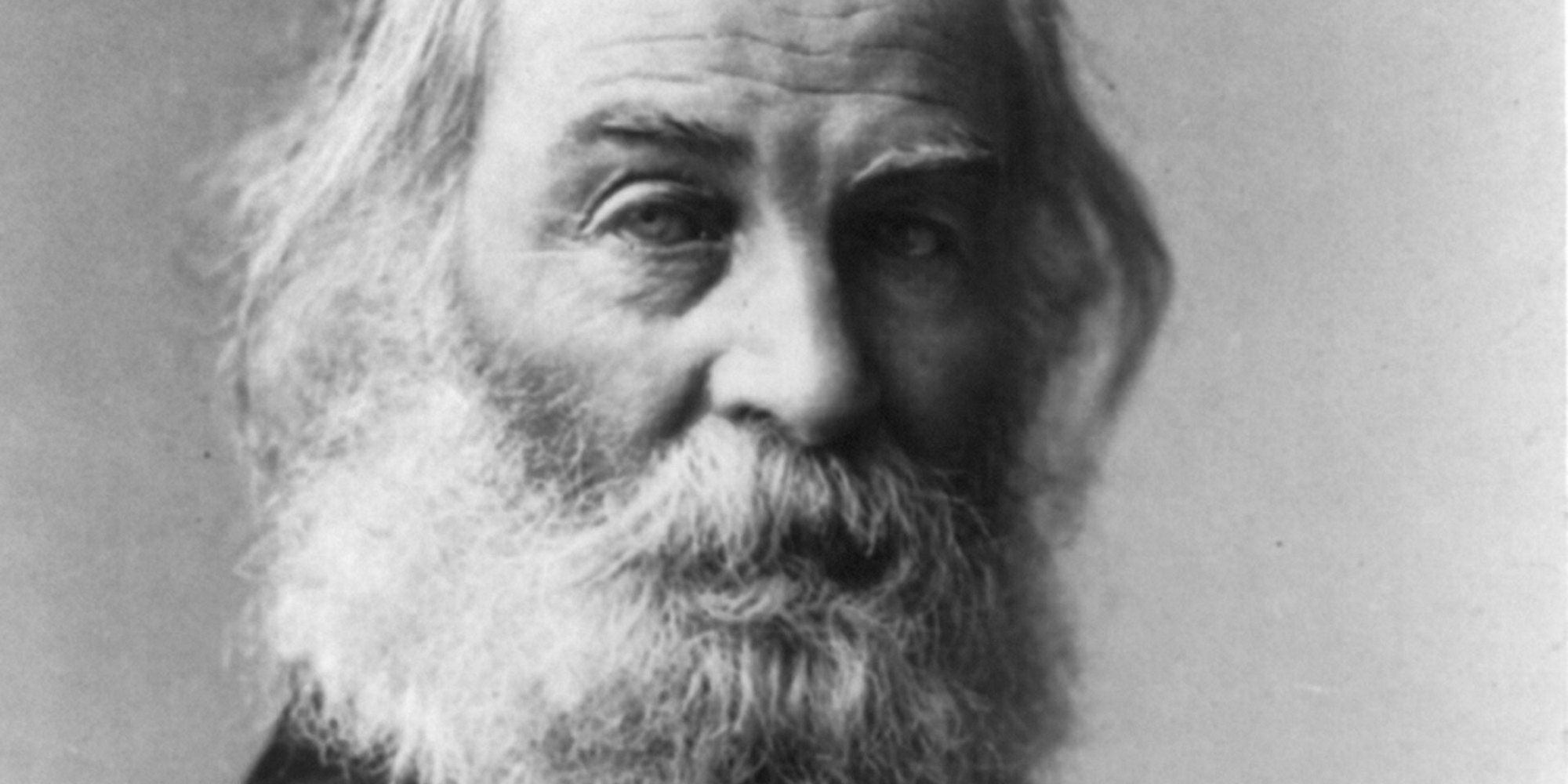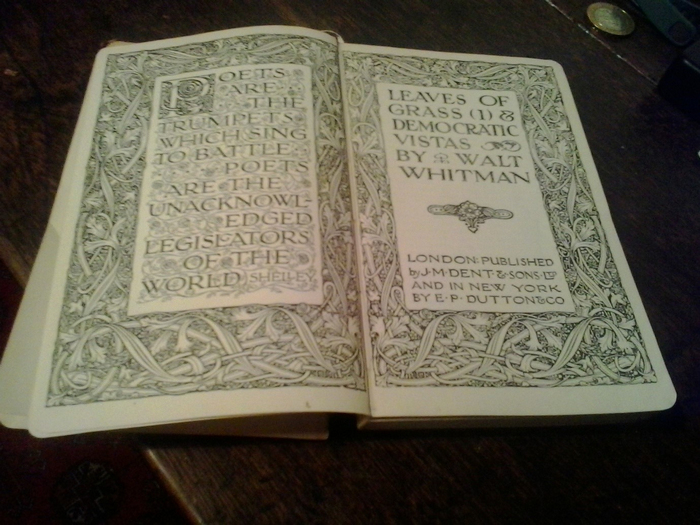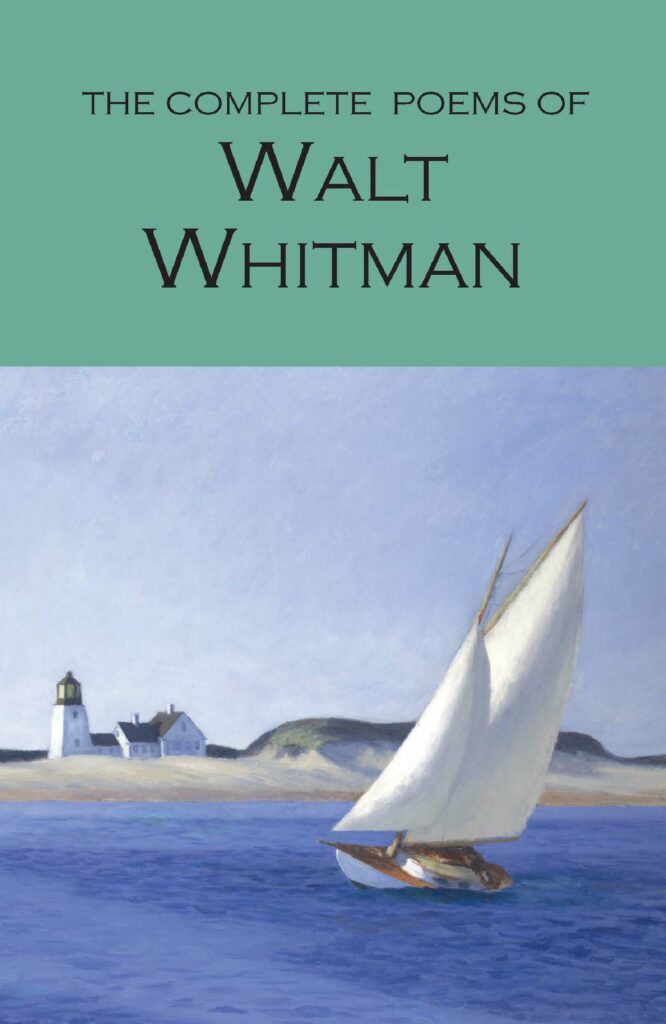
Walt Whitman, we salute you.
‘O camerado close!’: Sally Minogue salutes Walt Whitman on his birthday
Oneself I sing, a simple separate person,
Yet utter the word Democratic, the word En-Masse
Oh! how we could be doing with Walt Whitman at the moment. In these opening lines of his seminal poem Leaves of Grass, he announces that the ‘simple separate person’ is not antithetical to but an integral part of the ‘En-Masse’, flattening in two lines of poetry a distinction that currently bedevils political debate, in Europe as well as in America.
Whitman was writing at a time when the extraordinary political ideology of America was being formed. The first edition of Leaves of Grass was published in 1855, the same year in which Frederick Douglass published his slave narrative, My Bondage and My Freedom, and Henry Wadsworth Longfellow published Hiawatha. Emily Dickinson was also writing privately at this time, but with minimal publication. Of these, the text that came to me first was Hiawatha, read at primary school in the late ‘50s, with never an attempt to alert us to its cultural complexities. The thing I still remember most about it is the ‘Hiawatha’ rhythm. I met Whitman and Dickinson very late (considering my love of poetry from an early age) when I studied in America in the early ‘70s. Douglass came even later. These cultural and political lacunae were in part the result of sealed literary isolationism, now, thankfully, broken.
The co-existence of these texts, their writers, their points of view, and the social and cultural contexts from which they came, tells a story about America. Whitman, a consummate white American male author, has the privilege to embrace all others. Douglass speaks as the slave for whose freedom Whitman argues and stands – and for whom, yes, he sometimes speaks. Longfellow’s second-hand appropriation of Native American sources has had tremendous influence through its popularity, particularly in Europe. Dickinson is the buried female voice – though buried no longer. (See Stefania Ciocia’s blog on A Private Passion) There would indeed have been similarly buried Native American voices at this time, but, ironically, given their primacy in the land, theirs were the last voice to emerge to a general audience.
So Whitman benefitted from inherent supremacy; but it allowed him, in Leaves of Grass, to speak for and with all those voices. His individual is not the white American male, it is both woman and man; it is native and settler and immigrant; it is the North and the South; it is the slave and the free man, and the slave as a free man. There is perhaps a question mark against Whitman’s embrace of the Native American. To his credit, even at that time, he questioned the term ‘Indian’, preferring the term ‘aboriginal’ to recognise the primacy of the original inhabitants of what was becoming America. And he preferred to use the original language of those aboriginals in his naming of places and of native peoples. A few of the poems refer directly to the natives of the land. This brings us up against the whole issue of how we judge thinkers and writers of a previous era, and if it were anyone but Whitman, we would make excuses in terms of cultural difference. But Whitman sets his own standards, and we judge him, therefore more harshly, by them. (For a fuller account of his treatment of Native Americans, and how that is seen by current Native American thinkers, see whitmanarchive.org, an aptly compendious and accessible treasure trove for anyone interested in Whitman.)
Underpinning Whitman’s large embrace is what we would now call his gay voice (thoughtfully and knowledgeably outlined in Stephen Matterson’s introduction to the Wordsworth edition). There is no doubt that Whitman spoke feelingly about a man’s desire for a man: some of the most powerful passages in Leaves of Grass express this, most notably the Calamus section. At the same time, he was uncomfortable, externally to the poem, with anything that questioned his heterosexual masculinity, witness his letter in response to that of John Addington Symonds, maintaining, with a somewhat hysterical insistence, that he had fathered six children. What we need to remember here is the unprecedented nature of Whitman’s expressing such desires in the first place. In this respect, Whitman had a profound influence on later artists. (See photoworks.org.uk/showcase-davide-meneghello or a current artist responding to Whitman, and documenting his textual ambivalence in relation to his sexuality.) But perhaps even more extraordinary is that the whole moral, physical, sexual and ideological thrust of Leaves of Grass is its ecstatic embrace of EVERYONE. As Whitman says in his Preface, ‘A great poem is for ages and ages in common and for all degrees and complexions and all departments and sects and for a woman as much as a man and a man as much as a woman’. (Feminist poet Alice Ostriker recognises the debt of women to Whitman in her brave essay, ‘Loving Walt Whitman and the Problem of America’.)
Whitman’s Preface, and the lineaments of the poem itself, seem utterly modern in this respect, and it is hard to believe that they emerged in the middle of the nineteenth century. Imagine Alfred Tennyson (the right word for his response would be flummoxed) and George Eliot (who coolly reviewed it), actually reading this poem; they must surely have been astonished. From 1855 until the death-bed edition of Leaves of Grass in 1892, Whitman was telling the story of America, telling his own story, telling the individual stories of the peoples who made up America, but also speaking to Europe – a Europe whose values he wholeheartedly embraced. In return, the English edition of Leaves of Grass, published in 1868, had a continuing influence on English poetry. It must have been the impetus for Oscar Wilde to visit Whitman in 1882. Much later, Whitman was to be a talisman for poets going into the First World War, probably through the Everyman edition of 1912. This writer’s own ancient Everyman volume of Leaves of Grass is a descendant of that powerful volume:

Isaac Rosenberg and Ivor Gurney both carried copies of Whitman to the Front, and Gurney felt that in carrying the book, he carried Whitman as an actual companion:
On a Gloucester book-stall one morning
I saw brown ‘Leaves of Grass’ …
– a book that brings the clear
Spirit of him that wrote
(Ivor Gurney, Collected Poems, ed. P. J. Kavanagh, Manchester: Carcanet, 2004, 232)
Harold Monro, Siegfried Sassoon, and Edward Thomas were also admirers. These poets were undoubtedly responding in part to Whitman’s ‘Drum Taps’, a sequence about the American Civil War which was published separately in England in 1915. But they were also responding to the radical nature of the poem, and of the poet.
Gurney’s lines speak to the materiality of the text Leaves of Grass, the sense of the book itself carrying a power – something Whitman is alert to from the very start. His title puns on the word ‘leaf’, at once the artificial, manufactured, printed ‘page’, and the utterly natural ‘leaf’. Throughout the poem, Whitman addresses the reader directly and reminds him/her that they have an actual artefact in their hand, which he also somehow transforms into himself, the author, as a flesh and blood creature inhabiting the book.
Whoever you are holding me now in hand
And later
Thrusting me beneath your clothing,
Where I may feel the throbs of your heart or rest upon your hip (89)
This is uncomfortable stuff. Whitman is getting too close!
Yes – the poem can be cloying, and plenty of readers and critics have found it so. An 1881 review of the final edition of Leaves of Grass catches the untrammelled nature of Whitman’s poem in comparison with the previous tradition, and parodies corresponding critical reactions:
Into this hothouse air of literature, Walt Whitman bounded, with the vigour and the suppleness of a clown at a funeral. Dire was the grimaces of the mourners in high places, and dire are their grimaces still.
There were plenty of criticisms to make, even after one had finished crying Oh! at the frank sensuality, the unbelievable nakedness of Walt. Everything that decent folk covered up, Walt exhibited and boasted of exhibiting! He was proud of his nakedness and sensuality. He cried, Look here, you pampered rogues of literature, what are you squirming about, when you know, and everybody knows, that things are just like this, always have been, always will be?
This is a neat send-up of both Whitman and his critics, but it remains sympathetic to all that ‘Walt’ represents. If we hear Whitman as he wants to speak to us, any carping falls away. He is a magnificent voice of inclusiveness, openness, freedom, and magnanimity. The lines which Allen Ginsberg used as the epigraph to his equally extraordinary American poem, Howl, a hundred years after the first edition of Leaves of Grass, carry the authentic iconoclastic Whitman tone:
Unscrew the locks from the doors!
Unscrew the doors themselves from their jambs
But it is what follows those lines that really demands our attention:
Whoever degrades another degrades me,
And whatever is done or said returns at last to me.
…
Through me many long dumb voices,
Voices of the interminable generations of prisoners and slaves …
And of the rights of them that others are down upon,
Of the deform’d, trivial, flat, foolish, despised,
Fog in the air, beetles rolling balls of dung. (41-42)
Whitman himself may seem as though he is rolling all of humanity into one indistinguishable ball, but in fact, he is doing the opposite. As we read his poem, hold him by the hand, thrust him next to our hearts, he is urging us as human individuals to see the other human, however lowly (especially the lowly) as a being like ourselves – separate, but like. As such, he speaks, and reminds us likewise to speak, for ‘the rights of them that others are down upon’. It is a call we need to heed at this moment.
Further reading and online references
Walt Whitman’s Song of Myself: A Sourcebook and Critical Edition, ed. Ezra Greenspan, New York and London: Routledge, 2005. Excerpts from Ostriker’s essay are included in this, along with much interesting information about the production and reception of Leaves of Grass, including the 1881 review quoted above.
whitmanarchive.org has all we know and all we need to know about Whitman.
Books associated with this article
